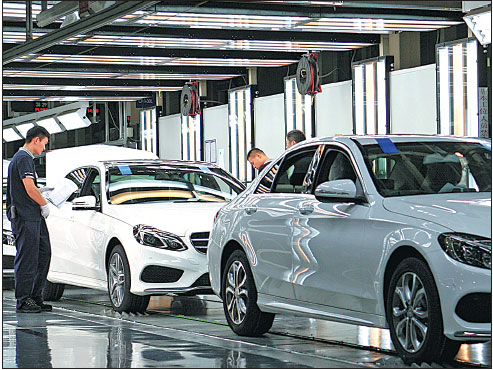Beijing Benz celebrates millionth unit
The 1 millionth vehicle rolled off Beijing Benz Automotive's assembly line in November, symbolizing the Sino-German joint venture's breakthrough in world-class manufacturing quality and operation capacity.
The achievement was made not only for 14 localized car models, but also for its locally-produced engine models.
"The 1 million units of Mercedes-Benz, formulated with passion and glory, resemble BBAC's speedy development and the countless efforts rooted in China," said Peter Schabert, president and CEO of BBAC. The joint venture was invested in by German automaker Daimler AG and its Chinese partner BAIC Motor.
Chen Hongliang, senior executive vice-president of BBAC, said that "BBAC undertook drastic changes on its way to the 1-million-unit milestone".
The company has been constantly absorbing new, state-of-the-art technology and techniques, and has established a future-oriented intelligent manufacturing system.
BBAC achieved its historic record by selling 143,398 units in the first half of this year, climbing to second place among its luxury peers in the world's largest market, with a much higher growth rate than the industrial average.
"Backing BBAC's great leap in development, it's our ambition, determination and devotion to erect the benchmarks for the Chinese automotive industry, to promote the upgrading of the sector, and to offer the same top-quality, superior riding experience under the same brand badge," Chen noted.
BBAC's 1-million-unit achievement also reflects Beijing's forerunner status in advanced manufacturing.
The municipality is advancing the industrial upgrading and restructuring of its manufacturing sector, with a focus on technological innovation.
Government data shows that 326 pollution-prone businesses and 150 low-end markets were shut down in Beijing last year in an ongoing elimination and relocation campaign targeted at companies that fail to meet environmental standards or are off the city's industrial development path.
"Beijing focuses on innovation and those businesses at the high end of the value chain in the manufacturing industry, rather than ordinary sectors," said Zhang Boxu, director of the Beijing Municipal Commission of Economy and Information Technology.
Manufacturing businesses with heavy pollution and high energy consumption need to give way to high-tech industries and those sectors included in the city's development plan, Zhang said. Government data shows that Beijing's high-tech manufacturing sector reported a 6.7 percent increase in industrial added value in 2015 from a year earlier.
|
Employees work on an assembly line at Beijing Benz Automotive's plant.Wang Zhuangfei / China Daily |
(China Daily 12/20/2016 page12)









